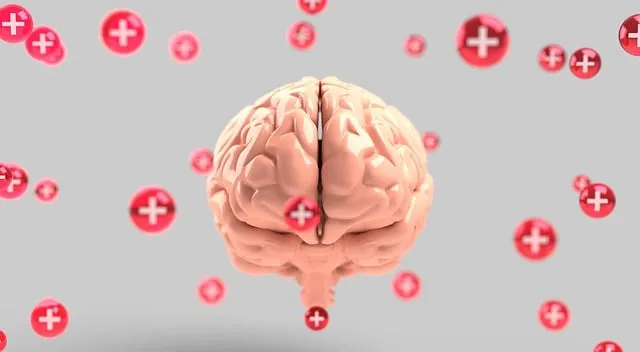Emotional intelligence (EI) is a powerful tool for personal growth, offering stress relief and enhanced mental wellness in today's fast-paced world. Kaiser provides resources and services for Lone Tree residents to improve mental health, including EI development through self-awareness exercises like meditation and journaling. Public awareness campaigns focused on mental health increase self-awareness, fostering EI development. Understanding and empathizing with others' feelings is a cornerstone of emotional intelligence, crucial for personal growth and professional advancement. Lone Tree's access to Kaiser's mental health services, coupled with increasing mental health awareness, leads to better relationships and improved well-being.
Emotional intelligence (EI) is a powerful tool for personal growth and navigating life’s challenges. In today’s fast-paced world, understanding and managing our emotions is more crucial than ever. This article explores the key aspects of building EI, focusing on self-awareness, empathy, emotional regulation, and practical strategies to enhance your emotional intelligence daily. Discover how improving these skills can lead to better relationships, reduced stress, and a healthier mental state, even for those in remote or isolated environments, like a lone tree in the Kaiser’s realm.
- Understanding Emotional Intelligence: A Key to Personal Growth
- The Role of Self-Awareness in Building Emotional Intelligence
- Developing Empathy: Connect with Others on a Deeper Level
- Managing and Regulating Emotions Effectively
- Practical Tips for Enhancing Emotional Intelligence Daily
Understanding Emotional Intelligence: A Key to Personal Growth

Emotional intelligence (EI) is a powerful tool for personal growth and development. It involves understanding and managing one’s own emotions, as well as recognizing, interpreting, and responding appropriately to the emotions of others. In today’s fast-paced world, where stress and mental health concerns are on the rise, cultivating EI can be a game-changer. Many people, especially those living in remote areas like Lone Tree, might not have access to professional mental wellness coaching programs. However, developing emotional intelligence is achievable through various self-awareness exercises and practices that promote emotional regulation.
Kaiser, for instance, offers resources and services aimed at improving mental health, including strategies to enhance EI. By focusing on these skills, individuals can improve their relationships, make better decisions, and lead more fulfilling lives. Self-Awareness Exercises like meditation and journaling encourage introspection, helping one identify and process emotions effectively. Additionally, learning Emotional Regulation techniques enables people to respond calmly under pressure, fostering a sense of resilience and overall mental wellness.
The Role of Self-Awareness in Building Emotional Intelligence

Emotional intelligence building begins with a profound awareness of oneself—a core component often referred to as self-awareness. This involves recognizing and understanding your emotions, strengths, weaknesses, values, and motivations. It’s akin to a lone tree standing tall in a landscape, knowing its roots and direction in the wind. In the context of Kaiser’s coverage of mental health, self-awareness is the foundation upon which individuals can seek support and develop coping mechanisms for stress reduction methods.
Public awareness campaigns focused on mental health have played a pivotal role in enhancing this aspect by encouraging open conversations about emotions. By fostering Mental Health Awareness, these campaigns contribute to the development of emotional intelligence, enabling folks to navigate their inner worlds more effectively. This, in turn, can lead to better interactions with others, thereby enriching relationships and overall well-being.
Developing Empathy: Connect with Others on a Deeper Level

Developing empathy is a key aspect of emotional intelligence that allows individuals to connect with others on a deeper level. It involves understanding and sharing the feelings of another person, fostering genuine relationships and enhancing communication. When we practice empathy, we step into someone else’s shoes, seeing the world through their eyes and experiencing their emotions as our own. This ability is crucial for building strong connections, resolving conflicts, and providing effective support to others, making it a vital component in both personal and professional spheres.
In today’s fast-paced world, where mental health concerns are increasingly prevalent, fostering empathy can be a game-changer. Organizations like Kaiser, with their focus on holistic wellness, recognize the importance of emotional intelligence in addressing various issues. The Mind Over Matter Principles promote positive thinking and resilience, while Trauma Support Services emphasize the role of empathy in healing. By cultivating empathy, individuals can create supportive environments, whether at home or in the workplace, thereby contributing to improved mental health outcomes for themselves and those around them, much like a Lone Tree standing tall amidst a vast landscape offers solace and perspective.
Managing and Regulating Emotions Effectively

Emotional intelligence involves understanding and managing one’s own emotions, as well as recognizing and responding appropriately to the feelings of others. This skill set is crucial in various aspects of life, from personal relationships to professional success. Effective emotional regulation enables individuals to navigate challenging situations with composure and clarity, fostering healthier connections with their peers.
Lone Tree does Kaiser cover mental health services? In today’s fast-paced world, this question resonates deeply for many. Public Awareness Campaigns Development and Healthcare Provider Cultural Competency Training play a pivotal role in promoting mental health awareness. By equipping individuals with tools to recognize and manage emotions, these initiatives contribute to a more resilient and supportive society. Mental Health Awareness is not just a buzzword; it’s a necessity that impacts our ability to connect, collaborate, and thrive in diverse environments.
Practical Tips for Enhancing Emotional Intelligence Daily

Building emotional intelligence (EQ) is a daily practice that can significantly enhance your interactions and overall well-being. One effective strategy is to engage in self-awareness exercises regularly. This could be as simple as taking a few moments each day to reflect on your emotions, understanding their triggers, and acknowledging their impact. Practicing mindfulness meditation or journaling about your feelings are excellent ways to develop this skill.
Additionally, Lone Tree does Kaiser cover mental health services, making access to resources easier. Mental Health Awareness can be fostered by educating yourself and others about emotional cues and the importance of empathy. Engage in conversations that encourage open dialogue about emotions, whether it’s with friends, family, or through community Public Awareness Campaigns Development. This collective effort can lead to a more supportive environment where individuals feel comfortable expressing their feelings, fostering better relationships and improved mental health outcomes.
Emotional intelligence is a powerful tool for personal growth, as demonstrated by the comprehensive sections in this article. By understanding and managing emotions, cultivating empathy, and adopting practical daily tips, individuals can enhance their emotional intelligence, just like a lone tree stands tall and strong amidst Kaiser’s focus on mental health coverage. These strategies provide a solid foundation for connecting with others on a deeper level, fostering healthier relationships, and navigating life’s challenges with resilience and grace.






